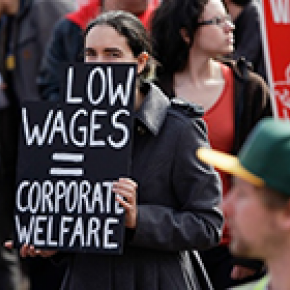Progressive Groups Press Hillary Clinton On Wall Street's Golden Parachutes
The groups note that during Clinton's tenure as secretary of state, two of her aides -- ...
The groups note that during Clinton's tenure as secretary of state, two of her aides -- former Deputy Secretary Tom Nides and former undersecretary Robert Hormats -- received large bonuses, or "golden parachutes," from their Wall Street employers when they left to join Clinton's staff. Nides worked at Morgan Stanley before he joined the State Department, and has since returned; Hormats worked at Goldman Sachs.
The letter asks whether Clinton still supports this type of bonus and whether she would allow new employees in her administration to receive the same kind of compensation, should she become president.
"Awarding outsized bonuses and gifts of equity to Wall Street executives who temporarily leave to go into public service is either a breach of a public corporation’s fiduciary duty to its stockholders, or a down payment on future services rendered," the letter said.
"If the latter, it at best creates the appearance of corruption and conflict of interest. At worst, it results in undue and inappropriate corporate influence at the highest levels of government -- in essence, a barely legal, backdoor form of bribery."
Sen. Tammy Baldwin (D-Wis.) and Rep. Elijah Cummings (D-Md.) recently proposed legislation that would ban golden parachutes and reduce the number of government officials who have past ties to the industries they are supposed to regulate. Two of Clinton's primary opponents -- Sen. Bernie Sanders (I-Vt.) and former Maryland Gov. Martin O'Malley (D) -- have backed the legislation, the letter to Clinton noted.
"Golden parachutes for government service are rare in most industries, but common among senior government officials who were previously employed at Wall Street banks," the letter continued. "Golden parachutes have become so common and corrosive to the public trust that it has become clear the next president should prohibit executive branch employees from receiving them altogether."
Clinton's campaign did not return a request for comment about whether she would support Baldwin and Cummings' bill, and has previously declined to comment about golden parachutes for stories from other media outlets.
Sen. Elizabeth Warren (D-Mass.), a major champion of dismantling the link between Wall Street and the federal government, called Baldwin and Cummings' legislation “a bill any presidential candidate should be able to cheer for” in July, and encouraged progressives to press presidential candidates on the issue.
The groups who sent the letter to Clinton are Rootstrikers, American Family Voices, Center for Popular Democracy Action, CREDO Action, Democracy for America, Friends of the Earth Action, MoveOn.org Political Action and The Other 98%. The organizations said in a press release that they collectively represent more than 9 million Americans.
Source: Huffington Post
No, 2016 Won't Be the Year of the $20 Minimum Wage
Bloomberg Businessweek - November 13, 2014, by Josh Eidelson - In the midterm elections, four red states—Alaska,...
Bloomberg Businessweek - November 13, 2014, by Josh Eidelson - In the midterm elections, four red states—Alaska, Arkansas, Nebraska, and South Dakota—passed minimum wage increases. Those votes mean that, starting next year, a majority of states will have minimum wages higher than the federal rate. The last time that happened, in 2007, Democrats newly in control of Congress used their power to pass the first national increase in a decade, from $5.15 to $7.25 an hour. It’s extremely unlikely the Republicans who took back the Senate in the midterm elections will do the same. “Waiting for Congress to act is frustrating and, at this point, pointless,” says Ed Flanagan, a former Alaska labor commissioner who spent a year campaigning for his state’s new increase, from $7.75 to $9.75.
Already, labor organizers in Oregon are considering a ballot initiative for 2016 that would raise the state minimum to $15 an hour, matching the leap taken this year by Seattle and San Francisco. In Los Angeles, where Mayor Eric Garcetti signed an ordinance mandating a $15.37 wage floor for some hotel workers in October, 6 of the 15 members of the city council have asked for a vote in early 2015 on a proposal to increase the city’s rate to $15.25 across the board by 2019.
Voters in most states shouldn’t expect to see pushes for higher rates than that anytime soon. Labor activists say they want to end the exclusion of tipped workers such as restaurant wait staff from minimum wage laws and add worker protections, like requiring employers to give workers advance notice of schedule changes or offer paid sick days. That approach worked this year in Oakland, where voters approved a referendum on Nov. 4 that lifts wages only to $12.25 but requires employers to offer paid leave above what the state requires. “When you combine them together, it’s actually more popular,” says Brian Kettenring, co-executive director of the Center for Popular Democracy, a union-backed community organizing group. “People appreciate that you are trying to actually solve the problem.”
Not all the coming fights will be put directly to voters. In California, Democratic Governor Jerry Brown signed a compromise bill last year increasing the statewide minimum from $8 to $10 by 2016. Some Democratic state lawmakers say that’s not enough to help workers make ends meet. “It will still allow the legal payment of a poverty wage,” says Mark Leno, the state senator who sponsored a bill that would have increased minimum pay to $13 by 2017 and then indexed future wage levels to inflation. That passed the state senate in May but failed by a single vote in an assembly committee. Leno plans to revive the issue in the next legislative session.
In some cities, Democrats are pitting themselves against the Republicans who control their state governments. Louisville has held hearings about raising wages to $10.10 after a statewide increase died in the Republican-controlled state senate. City officials in other states are hamstrung by laws prohibiting municipal governments from raising minimum wages above state levels. In June, business-friendly Democrats in Rhode Island’s statehouse killed efforts by the Providence city council to raise hotel pay to $15 an hour with a budget rider barring cities from setting their own minimum wages. In New York, where state law denies cities authority over pay rates, Governor Andrew Cuomo agreed to support changing that statute, along with a statewide increase to $10.10, to win the endorsement of the progressive Working Families Party in the November gubernatorial election. “He made a promise on this,” says Bill Lipton, the party’s New York director. “We expect him to fulfill it.”
Source
CFPB: Financial firms can no longer force consumers to use arbitration in group disputes

CFPB: Financial firms can no longer force consumers to use arbitration in group disputes
Consumers can now sue banks in class-action lawsuits. The Consumer Financial Protection Bureau said Monday financial...
Consumers can now sue banks in class-action lawsuits.
The Consumer Financial Protection Bureau said Monday financial companies will no longer be allowed to force customers to use arbitration to settle group disputes, restricting the industry's favored legal tool after years of review.
Read the full article here.
Aboard flight, dad battling ALS pleads with Sen. Jeff Flake to vote no on tax bill

Aboard flight, dad battling ALS pleads with Sen. Jeff Flake to vote no on tax bill
A 33-year-old father battling ALS, also known as Lou Gehrig’s disease, was flying home last week after traveling to...
A 33-year-old father battling ALS, also known as Lou Gehrig’s disease, was flying home last week after traveling to Washington, D.C., to protest the tax bill when he came face-to-face with one of the lawmakers he most hoped to influence.
Ady Barkan and others had spent a week trying to get lawmakers' attention and giving speeches outside their offices.
Read the full article here.
The United Cities of America: What Seattle's Minimum-Wage Deal Means
The Atlantic - May 2, 2014, by Eric Liu - On Wednesday, a Senate...
The Atlantic - May 2, 2014, by Eric Liu - On Wednesday, a Senate filibuster blocked President Obama’s proposal to raise the federal minimum wage to $10.10. Then on Thursday, Mayor Ed Murray of Seattle announced a business-labor deal to raise the city minimum wage to $15.
Procedurally, these two things had nothing to do with each other. Substantively, Seattle’s action is a direct result of the Senate’s inaction—and it portends the acceleration of two trends in public policy today: a growing willingness to reckon with radical inequality and wage stagnation, and the emergence of networked localism as a strategy for political action.
Let’s first unpack what happened in Seattle. The mayor appointed a committee of citizens to develop a proposal for $15. I was a member of that task force, which included union leaders and businesspeople and nonprofit heads and chamber-of-commerce chiefs. We gathered data. We commissioned studies. We held a big public symposium. Negotiations were complex and often heated and the committee missed its deadline, but we eventually got a deal that won the support of 21 of 24 members.
The grassroots “$15 Now” activists who helped propel a socialist to the city council and helped put this issue on the map last year are unsatisfied with the number of years and the accommodations. They aim to go to the ballot directly with a plan that’s closer to, well, $15 now. And the city council still must vote to enact this or any plan, and may come under pressure to amend it many ways.
The deal is nobody’s picture of perfect. It’s a compromise. It phases in minimum-wage hikes so that an employer has to get to $15 in three years (for businesses with more than 500 employees), four years (same, but offering healthcare), or seven years (for businesses with fewer than 500). The under-500 businesses also get several years to count a portion of worker tips and healthcare toward the wage requirements.
But pull back from the substantive details and the process hoops ahead. This is, as the vice president might say, a big f-ing deal. It’s not just the $15 figure, which sets the floor higher than in any other city or state. It’s the fact that a broad coalition with significant business support made it happen.
That makes this deal a model for other cities—and further evidence that norms are changing. It suggests that it’s becoming less acceptable in America to run a business in a way that relies on poverty wages. It’s becoming less acceptable to suggest that the go-to remedy for the pain of working people should be tax cuts for the wealthy. And though a minimum-wage increase is not an innovative tool, its revival is part of a widening repertoire of policy ideas for closing the opportunity gap.
We brought in leaders and experts from Chicago, Philadelphia, San Francisco, New York—all cities that have raised the wage or taken steps to.
Perhaps more significantly, Seattle’s action shows we’re entering a new age of bypass. Washington is stuck and will be for the foreseeable future. So it falls increasingly to cities to act—and in increasingly coordinated ways. As the Seattle task force explored possible pathways to $15, we brought in elected leaders and experts from San Jose, Chicago, Philadelphia, San Francisco, New York, all cities that have raised the wage or taken steps to. We all shared tactics, policy proposals, lessons, and language.
Groups like Local Progress have emerged to link up politicians and policy entrepreneurs from disparate cities, not just on wages but also on criminal-justice reform, immigrant rights, voting rights, climate change, and other issues. The cities of the United States are beginning to web up into an archipelago of policy experimentation and problem-solving.
This networked localism is distinct from the mere downward distribution of national political dollars to local campaigns. It’s also distinct from the Koch brothers’ strategy of creating wholly owned political subsidiaries in small towns to push agendas. And it’s not just about having mayors who are skillful, important as that is. Networked localism is a form of citizenship from the middle out and the bottom up, where residents decide to act together and to learn in real time from their counterparts in other places.
Thus far, perhaps owing to the progressive tilt of big cities, networked localism seems to be practiced mainly by progressives. That may place a political limit on its ultimate reach. Another limit, of course, is structural: On most issues, even well-woven webs of cities cannot do what a well-run national government can. A $15 wage will directly benefit tens of thousands of low-income workers in my city. It does nothing for millions of others in my country.
Nevertheless, it’s safe to say that Seattle’s $15 moment is a sign of a shift in self-government. The last century rewarded political leaders like TR or LBJ who knew how to centralize the local into the national. This century may belong to those who can decentralize the national—but into a new kind of national. Call it the United Cities of America.
Source
Democrats are back in the fight for the Arizona Eighth Congressional District: All Bets are Off.

Democrats are back in the fight for the Arizona Eighth Congressional District: All Bets are Off.
Trump won by over 20 points, the Democrat leads in fundraising as well, aided in part by Ady Barkan, a wealthy...
Trump won by over 20 points, the Democrat leads in fundraising as well, aided in part by Ady Barkan, a wealthy Democratic activist with the Center for Popular Democracy who was recently diagnosed with A.L.S. (Lou Gehrig’s Disease). In speaking with Bill Roe, the First Vice Chair of the Arizona Democratic Party, he indicated that this race is unpredictable for several reasons.
Read the full article here.
Second Draft of Scaffold Report Released
Times Union - September 3, 2014, by Casey Seiler - SUNY's Nelson A. Rockefeller Institute of Government has released a...
Times Union - September 3, 2014, by Casey Seiler - SUNY's Nelson A. Rockefeller Institute of Government has released a second draft of its controversial report on New York's Scaffold Law. According to the Institute's Deputy Director for Operations Robert Bullock, it's the only remaining version of the report that was shared with the report's funder, the state Lawsuit Reform Alliance.
The business-backed group, which opposes Scaffold Law, paid $82,800 to fund the report — sponsorship that has led critics to attack the study as advocacy in the guise of research. Its authors, however, insist the research was conducted in good faith.
Scaffold Law, which places "absolute liability" on employers for gravity-related workplace injuries, is supported by labor unions but opposed by business groups that claim it needlessly drives up construction costs — a thesis backed up in part by the report. Opponents would like to see New York follow other states by adopting a "comparative negligence" standard that would make workers proportionately responsible when their actions contribute to an accident.
The Center for Popular Democracy, a labor-backed group that supports Scaffold Law, lambasted the report upon its release last winter and requested copies of all communications between the institute and the Lawsuit Reform Alliance. That FOIL request produced a series of emails between researchers and LRA Executive Director Tom Stebbins, including Stebbins' suggested edits to a June 25, 2013, draft copy of the report that was not initially released by the institute.
The center appealed to SUNY, which ultimately released the June 25 draft. A comparison of the draft and the final report suggested that some of Stebbins' suggestions were reflected in the final version. Researchers, however, said any changes were the result of their efforts to sharpen their analysis, and not made due to pressure from the funder.
The newly released draft, dated Aug. 7, 2013, closely resembles the final report.
The center's Josie Duffy claims the six-week gap between the first and second drafts suggests that the institute moved quickly to follow the alliance's edits.
"SUNY says it has now disclosed everything it has, but given that LRANY and the authors held weekly conference calls to discuss the report's progress, we may never know the full extent of their influence over the final version," she said.
In an email, Bullock said the institute "has been open and honest about its contacts with funders and its research has been and will continue to be immune from influence."
"It is unfortunate," he added, "that a research organization known throughout the nation for the quality and character of its work should have to defend itself from accusations leveled by the Center for Popular Democracy, an organization well known for its partisanship."
Source
Immigration Advocates on SB 4: We’re Resisting in Texas
Grassroots leaders and local officials wasted little time organizing a coordinated campaign to fight SB 4, a new Texas...
Grassroots leaders and local officials wasted little time organizing a coordinated campaign to fight SB 4, a new Texas law that targets cities, towns and sheriffs that don’t cooperate with federal immigration enforcement.
Only nine days after Texas Republican Gov. Greg Abbott signed the legislation, formally known as Senate Bill 4, into law, grassroots advocates announced a “Summer of Resistance” campaign May 16. The statute allows police officers, sheriff deputies and Texas state troopers to ask about a person’s immigration status – whether they are here legally – during a routine stop.
Read the full article here.
The resistance is making one last all-out push to kill the GOP health bill

The resistance is making one last all-out push to kill the GOP health bill
More than 300 health care activists, disability rights advocates, and organizers gathered on second floor of the...
More than 300 health care activists, disability rights advocates, and organizers gathered on second floor of the Dirksen Senate Office Building on Monday morning to oppose Senate Republicans’ Graham-Cassidy health care bill.
The bill would sharply reduce spending for Medicaid by billions of dollars by tying it to medical inflation, blow up Obamacare’s marketplaces, and open the door for states to curtail protections for patients with preexisting conditions.
Read the full article here.
Representación legal gratis
Telemundo – July 21, 2013 - Indocumentados en NYC podrán contar con un abogado sin pagar honorarios. ...
Telemundo – July 21, 2013 - Indocumentados en NYC podrán contar con un abogado sin pagar honorarios.
Source












2 months ago
2 months ago